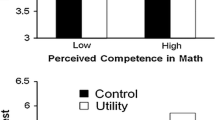Abstract
Tested the hypothesis that the identity-relevance of a performance domain would predict task motivation, stress, and actual performance. Psychology majors and non-majors (N = 94) completed either moderately difficult or very difficulty questions from a standardized verbal aptitude test. Before the test participants were told that performance on the test was either predictive of success as a psychologist (identity-relevant condition) or were given no information on the predictive ability of the test (control condition). Results revealed that only psychology majors evidenced higher motivation and stress in the identity-relevant condition in comparison to the control condition. The results of actual test performance revealed that when identity-relevance was high, psychology majors tended to do better than non-majors on a task of moderate difficulty, but tended to do worse on a task of high difficulty. Implications of the results for identity-relevance as a motivational and emotional lynchpin for performance are discussed.
Similar content being viewed by others
References
Blascovich, J., & Tomaka, J. (1996). The biopsychosocial model of arousal regulation. Advances in Experimental Social Psychology, 28, 1–51.
Blascovich, J., Mendes, W. B., Hunter, S. B., & Salomon, K. (1999). Social “facilitation” as challenge and threat. Journal of Personality and Social Psychology, 77, 68–77.
Britt, T. W. (1999). Engaging the self in the field: Testing the Triangle Model of Responsibility. Personality and Social Psychology Bulletin, 25, 696–706.
Britt, T. W. (2003). Motivational and emotional consequences of self engagement: Dynamics in the 2000 presidential election. Motivation and Emotion, 27, 339–358.
Britt, T. W., Adler, A. B., & Bartone, P. T. (2001). Deriving benefits from stressful events: The role of engagement in meaningful work and hardiness. Journal of Occupational Health Psychology, 6, 53–63.
Britt, T. W., Castro, C. A., & Adler, A. B. (2005). Self engagement, stressors, and health: A longitudinal study. Personality and Social Psychology Bulletin, 31, 1475–1486.
Britt, T. W., Thomas, J. T., & Dawson, C. R. (in press). Domain engagement magnifies the relationship between qualitative overload and performance in a training setting. Journal of Applied Social Psychology.
Brunstein, J. C., & Gollwitzer, P. M. (1996). Effects of failure on subsequent performance: The importance of self-defining goals. Journal of Personality and Social Psychology, 70, 395–407.
Brunstein, J. C., Schultheis, O. C., & Grassman, R. (1998). Personal goals and emotional well-being: The moderating role of motive dispositions. Journal of Personality and Social Psychology, 75, 494–508.
Erikson, E. H. (1968). Identity: Youth and crisis. New York: Norton.
Gendolla, G. H. E. (1998). Effort as assessed by motivational arousal in identity-relevant tasks. Basic and Applied Social Psychology, 20, 111–121.
Gendolla, G. H. E. (1999). Self-relevance of performance, task difficulty, and task engagement assessed as cardiovascular response. Motivation and Emotion, 23, 45–66.
Gollwitzer, P. M., & Kirchhof, O. (1998). The willful pursuit of identity. In J. Heckhausen & C. S. Dweck (Eds.), Motivation and self-regulation across the lifespan. New York: Cambridge University Press.
Kristof, A. L. (1996). Person-organization fit: An integrative review of its conceptualizations, measurement, and implications. Personnel Psychology, 49, 1–49.
Lazarus, R. S., & Folkman, S. (1984). Stress, Appraisal, and Coping. New York: Springer.
Petty, R. E., & Cacioppo, J. T. (1986). The Elaboration Likelihood Model of persuasion. In L. Berkowitz (Ed.), Advances in experimental social psychology (Vol. 19, pp. 123–205). New York, Academic Press.
Pomerantz, E. M., Saxon, J. L., & Oishi, S. (2000). The psychological trade-offs of goal investment. Journal of Personality and Social Psychology, 79, 617–630.
Schlenker, B. R. (1997). Personal responsibility: Applications of the Triangle Model. In L. L. Cummings & B. Staw (Eds.), Research in organizational behavior (Vol. 19, pp. 241–301). Greenwich, CT: JAI.
Schlenker, B. R., Britt, T. W., Pennington, J., Murphy, R., & Doherty, K. (1994). The triangle model of responsibility. Psychological Review, 101, 632–652.
Steele, C. M. (1997). A threat in the air: How stereotypes shape the intellectual identities and performance of women and African-Americans. American Psychologist, 52, 613–629.
Steele, C. M., & Aronson, J. (1995). Stereotype threat and the intellectual test performance of African-Americans. Journal of Personality and Social Psychology, 69, 797–811.
Zajonc, R. B. (1965). Social facilitation. Science, 149, 269–274.
Author information
Authors and Affiliations
Corresponding author
Additional information
The author would like to thank Cynthia Ellison, Melissa Kinder, and Kelly Riddle for their assistance in data collection. A paper based on the results of the present study was presented at the 2004 meeting of the Southeastern Psychological Association and was the co-recipient of the outstanding professional paper award.
Rights and permissions
About this article
Cite this article
Britt, T.W. The Effects of Identity-Relevance and Task Difficulty on Task Motivation, Stress, and Performance. Motiv Emot 29, 189–202 (2005). https://doi.org/10.1007/s11031-005-9441-3
Issue Date:
DOI: https://doi.org/10.1007/s11031-005-9441-3




